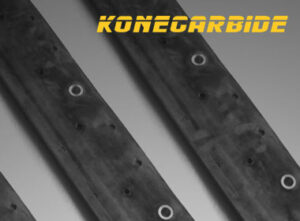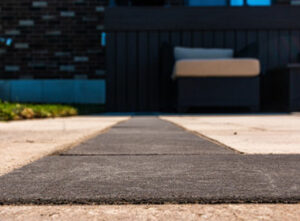Asphalt and concrete are the two most common paving materials for building roads. Whether it’s municipal engineering or personal driveway, we are faced with this choice. Basically, they are both a mixture of stone and sand, creating a gravel base. The difference lies in their adhesive materials. Tar is for asphalt and cement is for concrete, resulting in quite different features. In this article, we will dive into this topic: asphalt vs concrete, explaining the differences between these two solid materials. Read on to discover which one is a better choice for your projects.

Asphalt vs. Concrete: Cost
Generally, an asphalt road costs 45 to 50 percent less than a concrete road. Specifically speaking, asphalt roads cost $2.00 to $4.00 per square foot, $2.24 on average. While a concrete road usually costs $4.00 to $6.00 per square foot, $4.36 on average, the price may increase up to $15.00 per square foot due to some factors such as stains, finishes, and details.
Asphalt vs. Concrete: Maintenance and Repairs
Asphalt needs maintenance more frequently, but it is simpler to repair if cracks. Six months after an asphalt road is completed, it should be sealed. Then, every three to five years, it needs to be sealed again to extend the lifespan of the road. Concrete roads only require a seal once to beautify the appearance and protect the finish. But, applying degreasers is necessary to remove stains that accumulate as time goes by.
Both asphalt and concrete roads crack over time, so they should be repaired regularly. Since asphalt is less wear-resistant, it needs repair more frequently. However, asphalt roads are easier to fix and add new layers. When concrete roads crack, they are more difficult to repair and the repaired areas are obvious.
Asphalt vs. Concrete: Durability and Lifespan
As we mentioned above, asphalt is less wear-resistant than concrete, so it is less durable. With occasional degreasing and repairs, concrete can last 40 to 50 years. While asphalt can last 20 to 30 years.
Asphalt vs. Concrete: Design & Appearance
The design and appearance of pavement are also of vital importance. The look of asphalt roads is quite different from concrete roads. Due to the dark color of asphalt, it is also called “blacktop”. If you build asphalt roads, dark gray and black are the only two options. So, you may not get the desired look if apply asphalt. However, if you opt for concrete, you are free to choose the look of your road. Concrete roads are possibly be stained or tinted with any color you like. Besides, you can also brush a textured finish.
Asphalt vs. Concrete: Climate and Weather
Another important consideration is the climate and weather of the area you live in. This can directly determine the pavement materials you should use. Asphalt is more suitable for cold areas than concrete, because concrete may heave, crack, or buckle from repeated freezing. Besides, the salt used for ice melting can stain and erode concrete, making the surface ugly.
As for asphalt, hot weather has a negative impact on it. When the temperature is very high in hot summer, asphalt roads become sticky. If the temperature plunges then, asphalt can crack.
Conclusion
Asphalt vs concrete may be a difficult choice, and there is no perfect answer. It all depends on the budget, repair, durability, visual look, and climate. After reading this article, we believe that you can determine which one is right for your pavement project.
KoneCarbide provides top-quality road milling teeth, which are perfect replacement milling teeth for top-brand milling machines, such as Wirtgen, Kennametal, etc.








